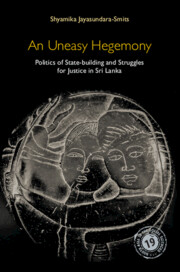
-
Select format
-
- Publisher:
- Cambridge University Press
- Publication date:
- 29 July 2022
- 10 November 2022
- ISBN:
- 9781009199230
- 9781009199247
- Dimensions:
- (229 x 152 mm)
- Weight & Pages:
- 0.59kg, 280 Pages
- Dimensions:
- Weight & Pages:
- Subjects:
- Area Studies, South Asian Government, Politics and Policy, Asian Studies, Political Sociology, Politics and International Relations, Sociology
- Series:
- South Asia in the Social Sciences (19)
You may already have access via personal or institutional login- Subjects:
- Area Studies, South Asian Government, Politics and Policy, Asian Studies, Political Sociology, Politics and International Relations, Sociology
- Series:
- South Asia in the Social Sciences (19)
Book description
Sri Lanka has been regarded as a model democracy among former British colonies. It was lauded for its impressive achievement in terms of human development indicators. However, Sri Lanka's modern history can also be read as a tragic story of inter-ethnic inequalities and tensions, resulting in years of violent conflicts. Two long spells of anti-state youth uprisings were followed by nearly three decades of civil war, and most recently a renewed upsurge of events are examples of the on-going uneasy project of state-building. This book discusses that state-building in Sri Lanka is centred on the struggle for hegemony amidst a kind of politics that rejects individual and group equality, opposes the social integration of marginalised groups and appeals to narrow, fearful and xenophobic tendencies among the majority population and minorities alike. It answers the pressing questions of - How do the dynamics of intra-Sinhalese class relations and Sinhalese politics influence the trajectories of post-colonial state-building? What tensions emerge over time, between Sinhalese hegemony-building and wider state-building? How did these tensions manifest in majority and minority relationships?
Reviews
‘Shyamika Jayasundara-Smits An Uneasy Hegemony: Politics of State-building and Struggles for Justice in Sri Lanka is a welcome addition to the growing body of new scholarly literature on Sri Lanka’ politics that has emerged after the end of the protracted ethnic war. The war and violence that engulfed the entire society for over three decades had also shaped and defined the possibilities as well as the limits of the agenda and orientations of the country’s social science scholarship for some time. Being able to move out of the shadow of the conflict, Jayasundara-Smits reframes and then re-examines the problematic of state building in post-colonial Sri Lanka by focusing on the connections between the hegemony building processes and the politics of the state-building project. The book provides refreshingly new material as well as interpretive insights into the inevitable tensions between the two parallel projects, hegemony building and state building.’
Jayadeva Uyangoda - Professor Emeritus in Political Science, University of Colombo, Sri Lanka
‘A very fine analysis laced with irony that moves away from the prism of ethno-religious conflict to give centrality to class in the process of state building in late colonial and postcolonial Sri Lanka. Shyamika Jayasundara-Smits convincingly challenges the constructed ontology of ethnicization. This deeply rooted investigation guides us with deft precision through the various incarnations of Sinhala Buddhist ideology and patronage politics towards a devastating conclusion. An original and eloquent book.’
Nira Wickramasinghe - Chair and Professor of Modern South Asian Studies, Leiden University Institute for Area Studies, The Netherlands
‘This book offers readers a fresh intersectional lens for understanding politics in Sri Lanka. Drawing on studies of nationalism, decoloniality, and class, the book analyzes ‘hegemony-building processes.’ Drawing up her personal experiences growing up in Sri Lanka and her expertise in conflict transformation and peacebuilding, the author offers a significant contribution to the analysis of war and peace, polarization and repression in Sri Lanka.’
Lisa Schirch - Richard G. Starmann Sr. Professor of the Practice in Peace Studies, Keough School of Global Affairs, Kroc Institute for International Peace Studies, University of Notre Dame, USA
‘This book engages in, and makes an important contribution to, longstanding debates on the trajectory and character of Sri Lanka’s postcolonial state. Though ostensibly now a post war state, it remains a state in crisis. This lends urgency to the task of better understanding the historical and contemporary politics of statebuilding in Sri Lanka. The author eschews a narrow focus on ethnicity and armed conflict, instead providing a more intricate and integrated analysis of the discursive, political and economic factors that have shaped Sri Lanka’s contested trajectory. At a time of a global resurgence of populist and authoritarian politics, it is important to look carefully at the particular conditions that give rise to such projects, as this book does so admirably.’
Jonathan Goodhand - Professor of Conflict and Development Studies, SOAS, University of London
Contents
Metrics
Full text views
Full text views help Loading metrics...
Loading metrics...
* Views captured on Cambridge Core between #date#. This data will be updated every 24 hours.
Usage data cannot currently be displayed.
Accessibility standard: Unknown
Why this information is here
This section outlines the accessibility features of this content - including support for screen readers, full keyboard navigation and high-contrast display options. This may not be relevant for you.
Accessibility Information
Accessibility compliance for the HTML of this book is currently unknown and may be updated in the future.


